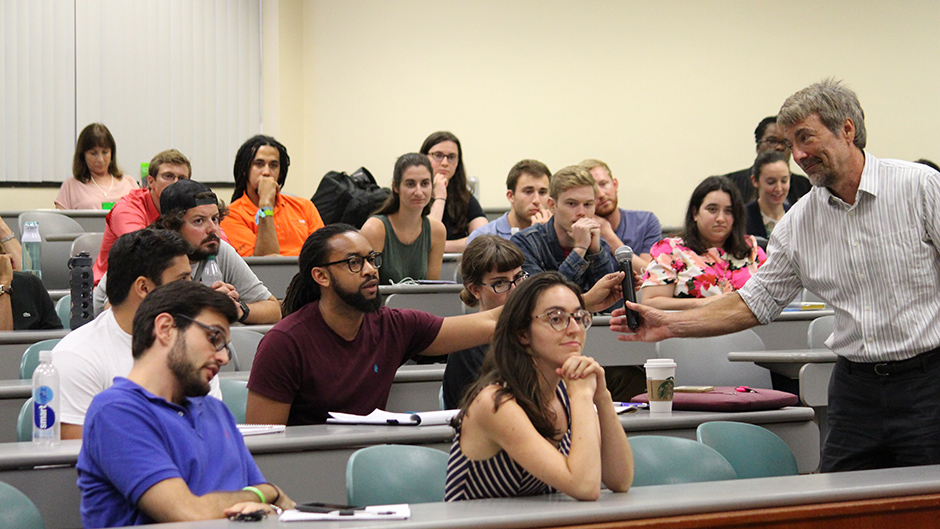Professor Caroline Corbin, who teaches constitutional law with a specialty in the first amendment, opened the remarks with a discussion of the views expressed at the “Unite the Right” rally in the context of the legal right to free speech.
“As is true with all constitutional rights, the right to free speech is not absolute,” she said. “The government may limit it in certain circumstances.”
Although even the most morally repugnant hate speech is generally protected under the first amendment, Corbin holds, the incident in Charlottesville nonetheless represents a violation of the right to free speech.
“When you intentionally encourage other people to break the law, and there’s a good chance that they’re soon actually going to go break the law, that’s incitement. Or when you intentionally make a particular person fear for their safety, that’s a true threat,” she said. “If your hate speech falls into one of those categories, it could be banned."
Elaborating on Corbin’s analysis of the first amendment, Professor Patrick Gudridge, who also teaches constitutional law, talked about the contentious nature of the right to freedom of expression.
“When you look right under the surface of what [Professor Corbin] talked about, it is just this massive, terrifying, squirming mess of fights among people who have differing views of free speech.
Gudridge’s concern with the events in Charlottesville lies in the resurfacing of the hateful, discriminatory ideologies which many had thought were left behind in the 20th century.
“Charlottesville is unnerving, in part, because of the ideas and institutions and people we want to move past,” he said. "These sorts of people pop up right in our face.”
Professor Mary Anne Franks saw the Charlottesville incident as a bout of first amendment fundamentalism, which she likened to religious fundamentalism. Franks is an expert in first amendment law and is currently teaching a seminar on first amendment fundamentalism.
“My suggestion is that the fundamentalist worldview is not something that is limited to religion,” she said, “and that in particular we, in this country, have a fondness for first amendment fundamentalism.”
Franks gave the perspective of white nationalists in Charlottesville to explain their fundamentalist ideology and the dangers that that ideology brings about.
“We are focusing on the first amendment as the right. It’s the most important right, and we should consider it and honor it in a way that is to the exclusion of all other rights and values; it’s an obsessive focus on the first amendment, kind of in isolation of many of the other constitutional rights and values that we might also consider.”
She went on, “The passionate defense of freedom of speech in particular when it comes to this worldview, is an absolutist, anti-regulatory view, that [the first amendment] is something that must be defended at all costs.”
The discussion of the first amendment amidst the increasing prevalence of white supremacy is particularly relevant in light of the University of Florida’s recent move to deny Richard Spencer, a prominent alt-right leader, a platform to speak on its campus on September 12. UF President W. Kent Fuchs denied Spencer’s group, citing “concerns for safety” as the reason for denial. Auburn University also denied Spencer a platform, however, a federal judge granted Spencer’s request for an injunction as “Auburn presented no evidence that Mr. Spencer advocates violence,” and he was allowed to speak.
It remains to be seen whether Spencer will take similar action against UF, and whether he will continue to seek out University campuses at which to spread his message.

